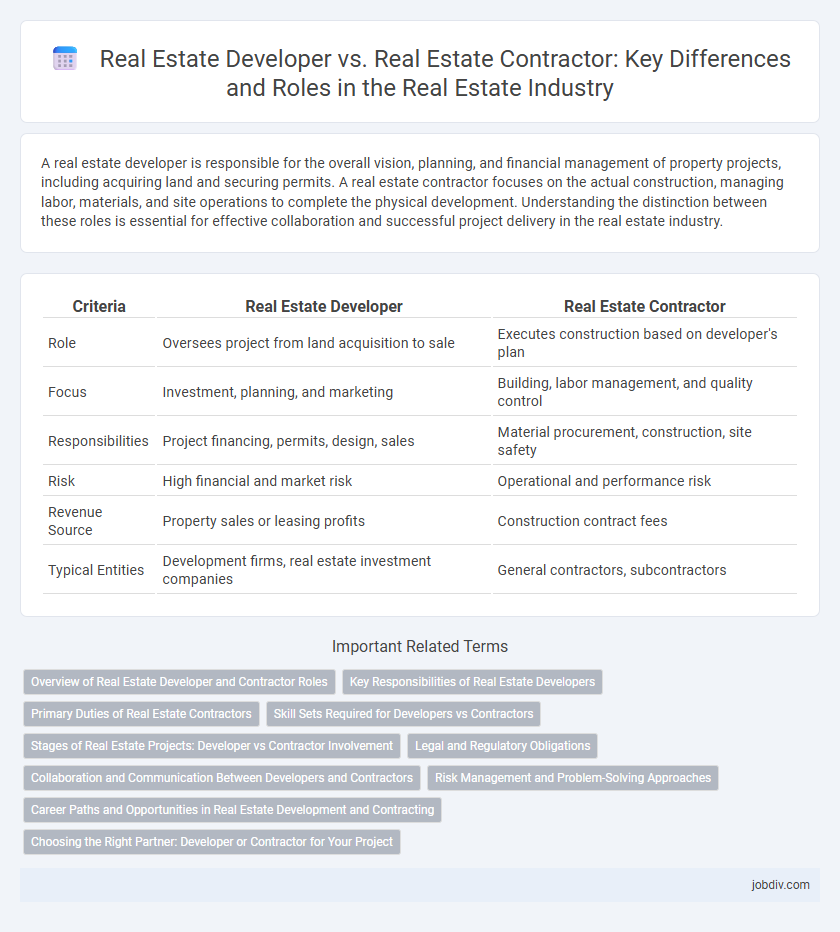A real estate developer is responsible for the overall vision, planning, and financial management of property projects, including acquiring land and securing permits. A real estate contractor focuses on the actual construction, managing labor, materials, and site operations to complete the physical development. Understanding the distinction between these roles is essential for effective collaboration and successful project delivery in the real estate industry.
Table of Comparison
| Criteria | Real Estate Developer | Real Estate Contractor |
|---|---|---|
| Role | Oversees project from land acquisition to sale | Executes construction based on developer's plan |
| Focus | Investment, planning, and marketing | Building, labor management, and quality control |
| Responsibilities | Project financing, permits, design, sales | Material procurement, construction, site safety |
| Risk | High financial and market risk | Operational and performance risk |
| Revenue Source | Property sales or leasing profits | Construction contract fees |
| Typical Entities | Development firms, real estate investment companies | General contractors, subcontractors |
Overview of Real Estate Developer and Contractor Roles
A real estate developer manages the entire property development process, from land acquisition and project financing to design approval and marketing. In contrast, a real estate contractor specializes in the physical construction, executing building plans, managing labor, and adhering to safety regulations. Both roles are crucial, but developers focus on project vision and financing while contractors handle day-to-day construction activities.
Key Responsibilities of Real Estate Developers
Real estate developers oversee the entire property development process, including land acquisition, securing financing, obtaining permits, and coordinating design and construction. They manage project timelines, budgets, and stakeholder relations to ensure the successful completion and market readiness of residential, commercial, or mixed-use properties. Developers also conduct market research and feasibility studies to maximize investment returns and align developments with market demand.
Primary Duties of Real Estate Contractors
Real estate contractors specialize in managing construction projects, ensuring timely completion and adherence to building codes and safety regulations. Their primary duties include coordinating labor, materials, and equipment, overseeing subcontractors, and executing the physical construction of residential, commercial, or industrial properties. Unlike developers who focus on project planning and financing, contractors translate blueprints into tangible structures through effective project management and technical expertise.
Skill Sets Required for Developers vs Contractors
Real estate developers require strong skills in market analysis, financial modeling, project management, and strategic planning to evaluate property potential and secure funding. Contractors need expertise in construction techniques, site management, safety compliance, and quality control to ensure timely, on-budget project delivery. While developers focus on vision and financing, contractors emphasize hands-on execution and technical proficiency in building processes.
Stages of Real Estate Projects: Developer vs Contractor Involvement
Real estate developers lead the initial project stages, focusing on site acquisition, financing, design, and obtaining permits, while contractors become critical during construction and project execution phases. Developers coordinate land use planning and architect collaboration, whereas contractors manage labor, materials, and on-site supervision to ensure timely completion. Understanding these distinct roles optimizes project workflow and resource allocation in real estate development.
Legal and Regulatory Obligations
Real estate developers hold primary responsibility for securing zoning approvals, permits, and compliance with land use regulations, ensuring the project's legality from inception to completion. Real estate contractors operate under the developer's legal framework, adhering to building codes, safety standards, and contract specifications mandated by local and state regulations. Both entities must maintain rigorous documentation and risk management to fulfill statutory obligations and avoid litigation.
Collaboration and Communication Between Developers and Contractors
Effective collaboration between real estate developers and contractors hinges on clear, consistent communication throughout all project phases, ensuring alignment on objectives, timelines, and budgets. Developers provide the vision and financing, while contractors bring technical expertise and execution, requiring mutual understanding to address design adjustments and unforeseen challenges promptly. Utilizing project management tools and regular progress meetings enhances transparency and fosters a cooperative environment that drives successful project completion.
Risk Management and Problem-Solving Approaches
Real estate developers manage project risks by conducting thorough market analysis, securing financing, and overseeing the entire development process from land acquisition to sale, emphasizing long-term investment viability. Real estate contractors focus on mitigating construction-related risks through detailed planning, adhering to safety regulations, and resolving on-site issues promptly to ensure timely project completion. Both roles require strategic problem-solving, but developers prioritize financial and regulatory challenges, while contractors address technical and operational obstacles.
Career Paths and Opportunities in Real Estate Development and Contracting
Real estate developers focus on project planning, financing, and market analysis to bring property developments from concept to completion, offering career paths in development management, investment analysis, and urban planning. Real estate contractors specialize in the construction and execution phase, managing building crews, materials, and schedules, with opportunities as project managers, site supervisors, and construction estimators. Both career paths provide growth potential in commercial, residential, and mixed-use projects, with developers typically engaging in higher-level strategic roles while contractors concentrate on operational expertise.
Choosing the Right Partner: Developer or Contractor for Your Project
Choosing the right partner for your real estate project hinges on understanding the distinct roles of a developer and a contractor. A real estate developer oversees the entire project lifecycle, from land acquisition and financing to marketing and sales, ensuring strategic vision and regulatory compliance. In contrast, a real estate contractor specializes in the physical construction and project execution, managing subcontractors, materials, and timelines to deliver the completed structure efficiently.
Real Estate Developer vs Real Estate Contractor Infographic

 jobdiv.com
jobdiv.com